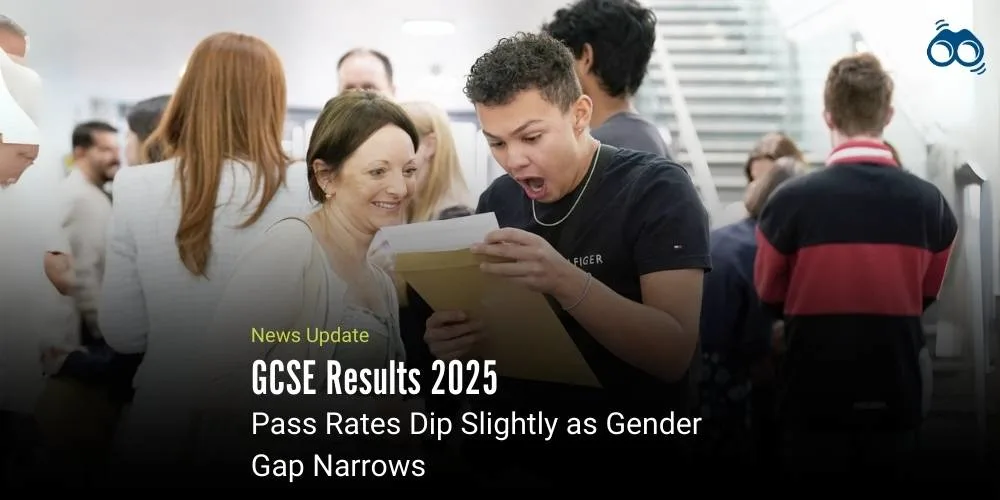GCSE Results 2025: What the Numbers Reveal About Student Attainment and Reform
Nearly Six Million Students Receive GCSE Results as Grading Standards Stabilise
The GCSE (General Certificate of Secondary Education) is a key academic qualification undertaken by students in England, Wales, and Northern Ireland, typically at age 16. It encompasses core subjects such as English, Maths, and Science, alongside optional disciplines like History, Art, and Modern Languages. Graded from 9 (highest) to 1 (lowest), with grade 4 considered a standard pass, GCSEs play a crucial role in shaping students’ next steps, whether progressing to A-levels, vocational courses, apprenticeships, or entering the workforce. While particularly important for university entry and many careers, especially in Maths and English, GCSEs are widely regarded as a foundation for future learning rather than a definitive measure of potential.
On 21 August 2025, nearly six million students across England, Wales, and Northern Ireland were reported to have received their GCSE results, marking a significant milestone in their academic journeys and in the broader UK education landscape. Official data indicated that 67.4% of students achieved a grade 4/C or higher, reflecting a modest decline from the previous year. This dip was understood to be part of ongoing recalibrations in GCSE benchmarks and the A-level grading system, as national assessment standards continue to stabilise following the post-pandemic shift back to pre-COVID norms. One of the most notable developments on GCSE Results Day was said to be the narrowing of the gender pass rate gap. Boys were reportedly closing in on girls’ performance, with the difference now at just 6.1 percentage points, the smallest recorded to date.
While girls continued to outperform boys overall, analysts suggested that the data pointed to a positive trend in male attainment, particularly in Maths and English GCSE. Regional disparities were also believed to be shrinking. London retained its position as the highest-performing region, while the West Midlands remained at the lower end; however, the gap between them had narrowed to 8.7 percentage points, indicating progress toward greater equity in UK schools' exam results. Throughout the day, students across the country were said to have shared stories of resilience, achievement, and reflection. Many celebrated strong results despite facing personal or academic challenges, while others sought guidance on their next steps. Educational experts emphasised that GCSEs represent only one part of a broader learning journey, and that students should not view their grades as definitive measures of future success.
For those who did not achieve the results they had hoped for, several pathways were reportedly available. Students could re-take GCSE subjects at college, enrol in adult GCSE courses, pursue apprenticeships, or gain experience through part-time work and volunteering. While passes in Maths and English GCSEs are often considered essential for employment and university entry after GCSEs, employers were said to value attributes such as teamwork, reliability, and a willingness to learn just as highly. To offer perspective, several public figures were cited as examples of success beyond academic grades. Footballer Cole Palmer, now a rising star at Chelsea FC, was reported to have failed GCSE PE. Singer Adele had previously admitted that she may not have received results in Maths or Science, despite excelling in English Literature.
Entrepreneur Richard Branson, who left school at 16 with no formal qualifications, went on to build the Virgin Group. Media personality Gemma Collins was said to have received a U in GCSE Maths and famously declared during her exam, “I’m going to be famous, I don’t need Maths.” These stories were widely interpreted as reminders that exam results news is only one chapter in a much larger narrative. As the day drew to a close, scenes of celebration, relief, and contemplation were reported in schools nationwide. For many students, the occasion marked not just the conclusion of one phase, but the beginning of another. Support remained available for those seeking advice, including student results day guidance, expert Q&As on retakes, appeals, and career planning. Whether students choose to continue their studies, enter the workforce, or explore alternative paths, they are reminded that success can take many forms and that their journey is far from over. GCSE Results 2025 have reaffirmed that academic outcomes are important, but not definitive, in shaping a student’s future.
Editor’s Note:
The release of the 2025 GCSE results marks an important milestone for nearly six million students across England, Wales, and Northern Ireland. This year’s outcomes underline both achievement and transition in the education system. While 67.4% of students secured a standard pass or higher, the modest decline compared with last year reflects the ongoing recalibration of grading standards following the return to pre-pandemic norms. Encouragingly, the results highlighted a narrowing of both the gender gap and regional disparities. Boys have made notable progress in core subjects such as Maths and English, and the performance gap between London and the West Midlands has reduced. These shifts suggest positive momentum towards greater equity in education. At the same time, the results remind us that academic grades, while significant, are not the sole measure of potential. Many students will now move forward through A-levels, apprenticeships, vocational training, or employment, with multiple routes available for those seeking to improve their results or pursue alternative paths. Employers and educators alike continue to stress that qualities such as resilience, adaptability, and commitment are just as valuable as examination outcomes. Stories of well-known figures who achieved success despite academic setbacks serve as an important reminder that exam results do not solely define one’s future. GCSEs form a foundation, but they are not the final measure of potential.
Skoobuzz observed that results day represents both an ending and a new beginning, an occasion for reflection, celebration, and preparation for the next stage of the journey.














0 Comments (Please Login To Continue)